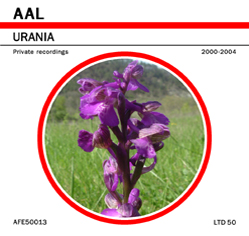[reviews]
afe50013
aal: urania
newsletter, the netherlands, june 2007
Davide Valecchi, the man behind aal, started in 2001 with playing more experimental music, after years of dabbling around in various other musical genres. In the early days of his career he released music on S'agita, which is still regarded as one of the more exciting labels from Italy, and sadly no longer around.
These days Valecchi releases on Afe Records, and they are now responsible for this five/six CD-R set, which looks professional and lovely, but of which apparently merely fifty copies exist. Five or six I write, as the official release is five CD-Rs, but a sixth one is included, which is sold separately and only available on demand, even when the catalogue number and cover artwork are similar to the box. This box contain works from the period 2000 to 2004 which haven't been released before or privately in a small edition. The enclosed list shows more unreleased works, so no doubt another box will follow one day.
The box set opens with 'Disc 2' (2000-2001), ('Disc 1' was also released by Afe) and is one of the first works he produced as aal. Here he works with synthesizers, effects, tape recorders, microphones and samplers, as opposed to the later work which uses a lot more computers. The pieces here are drone like, partly even referring to cosmic music of the seventies. The pieces are throughout a bit dark, as can be expected in the world of drone music and also a bit unfocussed. It was a promising start.
'Disc 3' sees a continuation of 'Disc 2' (2001), but with one big difference: it's more or less a live recording of 'altering streams of sound in real time'. These streams of sound come from radio, television, shortwave and analogue tape recorders, feeding through sound processors and samplers. Three long(er) pieces of floating and more angular drone music, bouncing up and down the scale in a kind of vibrant way, It moves back and forth in a sci-fi soundtrack manner and floats around like a space ship. A bit like good ol' Arecibo.
Both ends of the first two discs are brought together on 'Composita Solvantur' (2002-2003), which is a four part work, 'each part of which can be considered as a static description of the same place viewed from a different angle'. The four long pieces have the drone like character of 'Disc 2' but also the vibrancy of 'Disc 3'. The space age motif of the previous disc continues here, but the tracks are worked out better. At times it sounded like processed feedback, such as in 'Fase Solare', and when things get more darker and moodier, the influence of Maurizio Bianchi never seems far away. It's all quite ambient like, but it never looses the experimental touch. Quite a refined work.
Something similar can be said about 'Delicate Debris' (2004), even when it consist much more and much shorter pieces. Here aal tells us that he's using acoustic instruments such as piano, guitar, flutes and mandolin and 'it deals with the essence of loss'. Throughout the eleven tracks sound indeed desolate and empty, like small, mournful tunes. I am not sure here, but this could also be the point when aal uses more computerized methods to work on his music (though I might be wrong of course). If this had to be classified as something, I think ambient glitch would be the most appropriate term. Although mood, working method and shape is different from the previous one, this is also a great work.
The fifth one is 'Engine Summer' (2004). Various interests that we saw on the previous four discs (as well as other releases by aal in the past) are combined here: the deep end ambient music, electro-acoustic processing of objects and field recordings, but also there is rhythm to be found here, in a sort of slow, Chain Reaction manner, which makes this quite a full and somewhat unfocussed release. What does aal want here? Maybe the idea was to make a more mature album, of various interests combined into an album, but unfortunately the results are not always as great. It makes a OK release though.
The sixth, bonus, CD-R is a 'La Ruina', which is the one that goes to the area of field recording most. aal recorded a river on various locations and layers these recordings into a forty some minute piece. Of all the discs this is the one that lacks any form of electronics, and it's a pure soundscape, much along the lines of 'Map of Hudson River' or similar works. Hard to believe it has ten voices as it sounds consistent throughout. Quite a nice work.
Altogether this is a great work, showing a strong development, and aal venturing into different kinds of music, which sometimes works and sometimes doesn't. Let's wait for the next box, to see where he leads us then.
[Frans de Waard on Vital Weekly 582]
